
When I worked at HubSpot Support, I frequently referenced our knowledge base for product documentation, troubleshooting steps, and how-to guides for assisting customers. I frequently referred to both our internal wiki and our knowledge base; although they have some similarities, there are some clear distinctions.
If I needed a refresher on connecting an external domain to HubSpot, I’d head over to the knowledge base. But if I wanted to know which food trucks were coming to the courtyard that month? That’s a wiki question.
Knowledge bases and wikis are both designed to store and share information, but they have different use cases when you get down to specifics. In this post, I’ll break down the differences between wikis vs. knowledge bases and discuss the benefits of each.
Table of Contents
- Wikis vs. Knowledge Bases – What are they?
- What are the benefits and challenges of a corporate wiki?
- What are the benefits and challenges of a knowledge base?
- Investing in a Wiki vs. a Knowledge Base
Wikis vs. Knowledge Bases – What are they?
The terms wiki and knowledge base are often used interchangeably, but they’re not the same thing. Wikis and knowledge bases both store information, but that’s about where the similarities end.
So, wiki vs. knowledge base, what’s the difference?
The difference comes down to purpose and structure.
- A wiki is a collaborative space where anyone on your team can share or update information.
- A knowledge base, on the other hand, is a more formal resource where content is verified, structured, and typically editable only by select contributors.
To better understand the differences between wikis and knowledge bases, I’ll break them down one at a time.
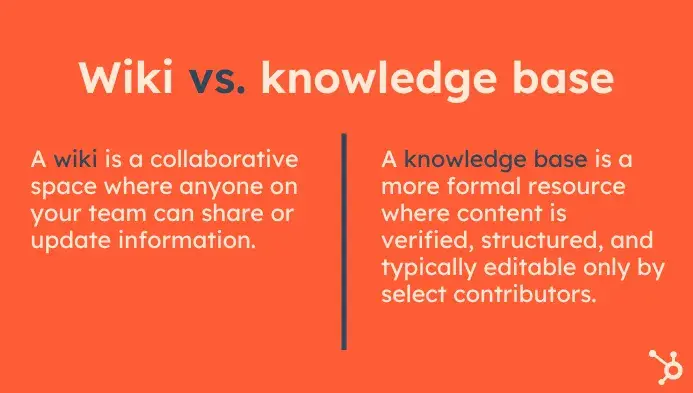
What is a knowledge base?
A knowledge base is a centralized, structured repository of verified information. It can be internal or external and serves as a single source of truth for critical company knowledge, FAQs, product documentation, SOPs, and more.
Most companies use an external knowledge base to document product features and publish step-by-step guides, and HubSpot is no exception.
HubSpot’s knowledge base is a customer-facing, highly-searchable treasure trove of everything a user might need to get the most out of the product. It’s not just for customers, though. As a HubSpot support rep, I referenced our knowledge base daily when troubleshooting customer inquiries.
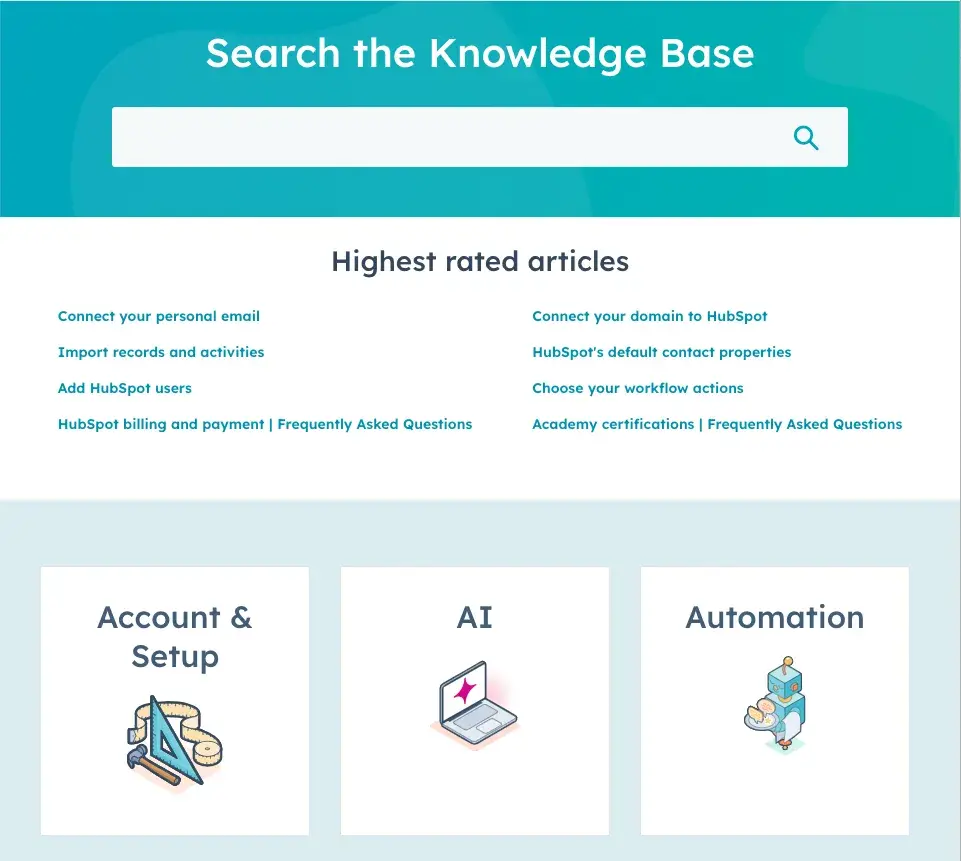
What makes a knowledge base special is how it’s curated. Knowledge base content is crafted by subject matter experts and reviewed for accuracy before publication. Ideally, a dedicated team maintains the knowledge base and keeps it up to date as products and processes evolve.
What is a wiki?
It’s impossible not to think of Wikipedia when discussing corporate wikis, and to be honest, I’m not sure which idea came first. What makes Wikipedia special is that anyone can contribute to it, and a company wiki shares the same philosophy.
A wiki is a collaborative internal hub where any team member can create, edit, and share information. Unlike a knowledge base, which is highly curated and restricted to a select few contributors, a wiki is like your company’s private Wikipedia. It is an ideal resource for quick note-taking, brainstorming, and knowledge sharing that doesn’t require strict oversight.
Below is an example of a wiki template I found in Notion that paints a clear picture of what a company wiki is all about:
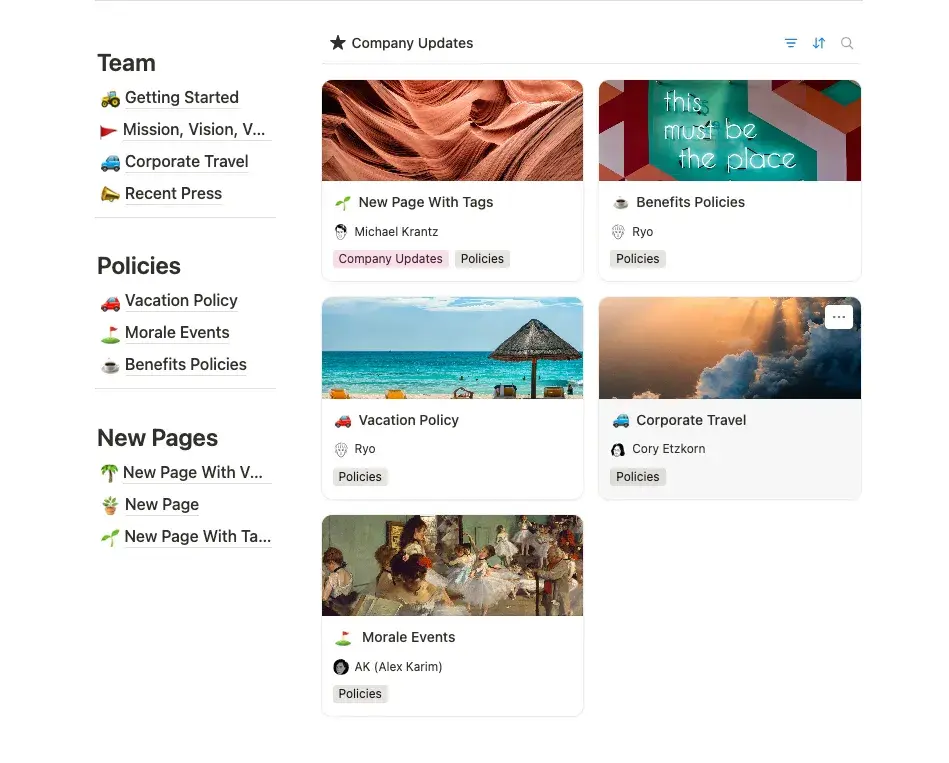
As you can see, a wiki is less formally structured than a knowledge base and carries information with less authoritative weight. Looking for information on vacation policy and upcoming team events? That’s wiki territory.
Wikis aren’t just for housekeeping and company policy, though. Wikis excel as collaborative tools for fast-moving teams. They shine in environments where transparency and speed are more important than structure. For example, engineering teams might use a wiki to publish guides, document internal best practices, and share deployment workflows.
Here’s another example from Notion:
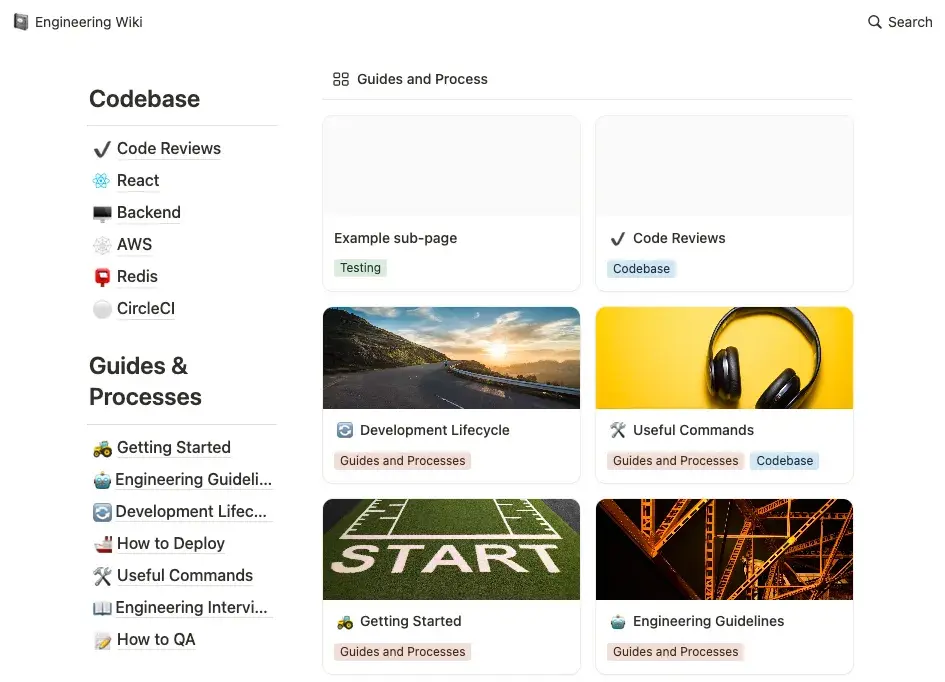
Now that I’ve covered what a wiki is and what a knowledge base is, let’s jump into the wiki vs. knowledge base differences that matter most.
How do a wiki and a knowledge base differ?
Wikis and knowledge bases are both valuable tools for storing and sharing information, but they differ in their use cases and formality.
- Wikis are great for collaboration since any team member is free to edit and add information. However, this flexibility comes at the cost of reliability and structure.
- Knowledge bases, on the other hand, are curated and maintained by a dedicated team of editors and experts, making them a repository of authoritative, consistent information that is meticulously structured and organized.
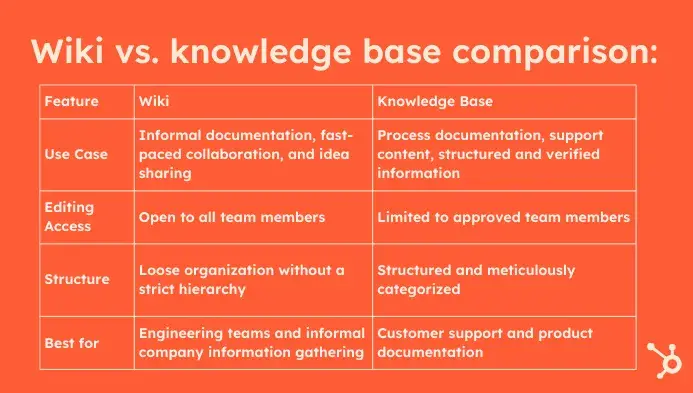
Wikis and knowledge bases both have advantages and drawbacks, which is why many companies use both.
Next, I’ll lay out the benefits and challenges of wikis and knowledge bases.
What are the benefits and challenges of a corporate wiki?
Corporate Wiki Benefits
1. Knowledge Retention
Wikis enable team members to easily share their knowledge of company processes, demonstrate their expertise, and document best practices. Since there is no approval process and employees can add and edit information at will, people are more likely to share their experience and knowledge on the wiki.
The result is reduced corporate amnesia, or a knowledge drain, which occurs when experienced employees leave a company and take vital knowledge and experience with them.
2. Higher Job Satisfaction
A corporate wiki can be the place for employees to shine. When I worked in HubSpot Support, I remember a particular team member who was very shy and rarely talked to anyone. However, she stood out in the corporate wiki, where she became known across the department as a support wizard. Everyone relied on her deep expertise and thorough documentation.
Providing employees with a space to share knowledge can boost job satisfaction by fostering recognition for expertise and contributions.
3. Better Productivity and Increased Collaboration
A corporate wiki can boost productivity and save employees time. Since important information is centrally stored in a searchable wiki, people won’t have to waste time tracking down a lost brainstorming doc or meeting checklist. It’s all one quick search away.
When I worked at HubSpot Support, our internal wiki saved me loads of time with easy access to post-meeting notes and documentation of hyper-specific edge-case support experiences that weren’t covered in the knowledge base. It made it easier for me to collaborate with other support representatives and provided me with the insights I needed to perform my job more effectively.
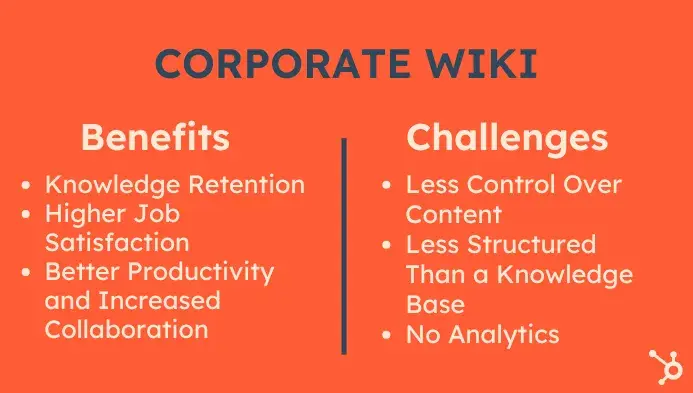
Corporate Wiki Challenges
1. Less Control Over Content
The beauty of a wiki lies in its collaborative nature. However, this can also be a drawback. Anyone can upload and update content without prior approval, leading to inaccuracies and outdated information. As a result, wikis might be viewed as less trustworthy.
Without a clear ownership model, it can be challenging to determine and trust the accuracy of information, especially when no one is technically responsible for maintaining it.
2. Less Structured Than a Knowledge Base
Wikis are excellent for quick documentation, but over time, they can get messy. For example, I might add a new document to the wiki only to discover that someone has already covered the topic.
Without a dedicated curation and editing team, it is easy for a wiki to become overrun with inaccurate or duplicate information. Wikis are also less structured and organized than knowledge bases, making it more difficult to find information. Typically, wikis rely on search functionality to overcome this hurdle, but if your wiki is overloaded, those results can be overwhelming.
3. No Analytics
Company wikis typically lack analytics features and feedback tools to measure which pieces of content are most useful to your team.
Without usage data, it can be challenging to maintain relevant and quality information, fill content gaps, and prioritize updates, especially in a large company with a bloated wiki.
What are the benefits and challenges of a knowledge base?
Here are some advantages and potential risks of running a knowledge base.
Knowledge Base Benefits
1. Building a Single Source of Truth
A well-organized knowledge base ensures that every employee knows where to find critical information, without having to second-guess its accuracy. Everything from FAQs to product documentation and troubleshooting guides is organized, categorized, verified, and easy to navigate.
When I worked in HubSpot Support, our knowledge base was the single source of truth for both reps like me and customers. I relied on it daily for accurate, up-to-date product documentation to guide my troubleshooting, and I never hesitated to share those articles with customers because I knew all of the information was verified and meticulously maintained.
2. Maintaining Consistency
A knowledge base ensures consistent information across your whole organization, keeping teams on track. Since knowledge base information is curated and reviewed, there is no risk of inconsistent, duplicate, or conflicting information circulating.
This becomes especially important when customers are involved. Hearing conflicting information from different representatives or across different departments can lead to a negative customer experience that erodes trust.
At HubSpot Support, I knew customers were receiving consistent, accurate information, whether it came from me or my teammates, because we were all working from the same knowledge base.
3. Training Benefits
A comprehensive knowledge base can be a massive pillar of the onboarding process. When I was a new hire on HubSpot’s Support team, I lost count of how many times I heard, “Did you search the knowledge base?” whenever I had a question.
Our knowledge base was a significant training resource for me. It provided me with access to troubleshooting guides, process documentation, and detailed information about every aspect of the product. It proved invaluable for my development as a new hire and continued to support my growth long after the “new guy” phase was over.
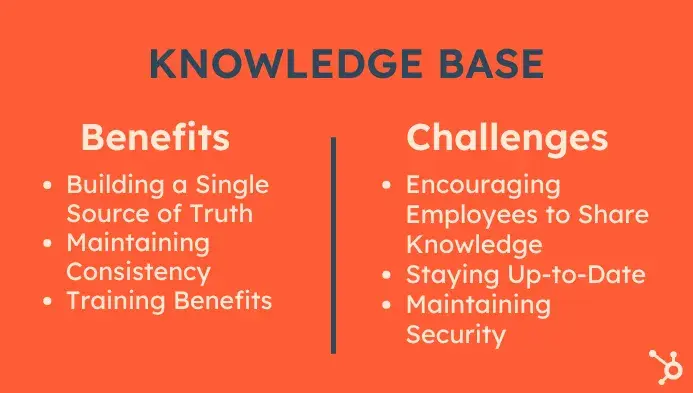
[alt[ knowledge base benefits and challenges
Knowledge Base Challenges
1. Encouraging Employees to Share Knowledge
I’ve learned that a knowledge base is only as valuable as the content inside it. Encouraging employees to contribute to your knowledge base can be a challenge, especially considering the higher standards for authoritativeness and expertise required for knowledge base content compared to wiki content.
Some employees may hesitate to contribute to a knowledge base due to the time commitment or because they are unsure whether their expertise is valuable enough to share. Ideally, your organization has a dedicated knowledge team for curating, creating, and maintaining content. If not, it’s essential to establish a culture of knowledge contribution early to prevent against knowledge drain when experienced team members leave.
2. Staying Up-to-Date
As your company and products evolve, your knowledge base content must keep pace. If knowledge is outdated, employees may rely on incorrect information, leading to confusion, mistakes, and poor customer experiences.
The key is creating a system for knowledge base upkeep. This should involve regularly scheduled content audits and a flagging system where team members can alert the knowledge team of any incorrect or outdated articles.
Pro tip: Leverage your customer support team to notify you about outdated or inaccurate content. As a support representative at HubSpot, I was neck deep in our knowledge base every day. I often flagged outdated or incorrect content long before the knowledge team would have spotted it in their review schedule.
3. Maintaining Security
A knowledge base may contain sensitive information about internal processes and proprietary software secrets. Even customer-facing content can be highly sensitive and shouldn’t be edited without approval.
That’s why it’s essential to select a high-quality and trustworthy knowledge base platform that safeguards your information and streamlines maintenance with granular permissions.
HubSpot’s Knowledge Base software enables you to create a top-of-the-line knowledge base with extensive controls for who can view, edit, and publish content, allowing you to protect your valuable knowledge while keeping it accessible to teams that need it.
Investing in a Wiki vs. a Knowledge Base
Knowledge bases and wikis are both valuable tools for storing and sharing business information, but they serve different purposes. Depending on your organizational goals, the products you offer, and how your teams operate, it could make sense to use a wiki, a knowledge base, or both.
Need an organized database of customer-facing product guides and documentation? A knowledge base is built for that. Meanwhile, a wiki can be just the thing for your agile engineering team looking to move fast, break things, and keep track of sprint notes and brainstorming docs.
The wiki vs. knowledge base debate isn’t really a debate at all. They are complementary tools for streamlining information access, and I would argue that most companies can utilize both: a wiki for internal collaboration and informal record-keeping, alongside a knowledge base for curated, searchable, verified content.
Editor’s note: This post was originally published in August 2022 and has been updated for comprehensiveness.
![]()













